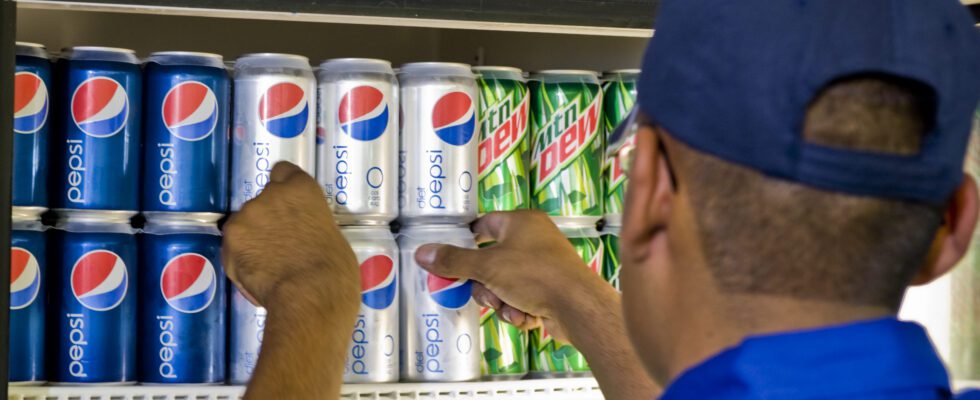Sustainability is certainly not the first thing you think of when you open a can of soda. But Athina Kanioura, director of strategy and transformation at PepsiCo, says the desire to create positive environmental impact is now at the heart of her company’s approach.
Whether it’s using AI to prevent water leaks in factories, developing bio-based thermoplastics for product displays, or using data platforms to meet regulatory requirements, PepsiCo says it puts every effort to ensure that the products sold are manufactured and delivered in the most sustainable way possible.
“It’s about how we can create a positive environment, whether it’s for the food value chain, for the customers we serve, or for the people who make and buy our products,” she says.
Innovation is a team sport
PepsiCo’s sustainability efforts are known as pep+ (PepsiCo Positive), which Chairman and CEO Ramon Laguarta has described as “the future of the company” and a fundamental transformation of what the company does and how it does it. According to Ms. Kanioura, technology is playing a key role in helping the company make this change.
- The first transformation concerns the products created by the company, whether they are cans of soda or packets of crisps.
- Another focus is on packaging and the shift from plastic to biodegradable materials.
- Finally, considerable efforts are being made in the field of agriculture.
PepsiCo employs approximately 250,000 people worldwide and develops a range of data-driven technologies in-house, including to ensure compliance with environmental, social and governance (ESG) regulations. However, the company also recognizes that innovation is a team sport, and it works with external organizations to develop innovative solutions to intractable sustainability challenges.

Athina Kanioura says sustainability is an integral part of PepsiCo. Image: PepsiCo
Prevent water leaks, detect failures, and make biobased thermoplastics
“For the different projects, we have different partners”, explains Athina Kanioura. “We address each specific issue with a tech startup or an established business.”
The work with the startups is led by David Schwartz, vice president of PepsiCo Labs, which is a specialist team under Kanioura’s leadership responsible for harnessing innovation. The lab has worked with over 30 startups in over 200 countries so far. And he’s also working on a series of products that help PepsiCo meet its sustainability goals.
- Examples include a partnership with technology company WINT, which uses artificial intelligence to prevent water leaks at PepsiCo factories. It is estimated that the system can reduce annual water consumption by 25%.
- In Turkey, PepsiCo is working with Pulse Industrial and BrenPower to monitor and detect steam trap failures at the company’s plants using an artificial intelligence system.
- PepsiCo is also working with UBQ Materials to transform unsorted household waste, including organics and non-recyclable plastics, into a bio-based thermoplastic that can be used in product displays.
According to Mr. Schwatrz, the goal is to introduce these innovations within the company and to produce beneficial results for the environment in the most efficient way possible. “We’re a big company with a big infrastructure,” he says. “We want to make sure the solution integrates seamlessly with PepsiCo’s system.”
Ensure that ESG factors are taken into account in investment analyzes and business decisions
In all of these pioneering areas, Mr. Kanioura stresses the need to ensure that ESG factors are taken into account in all investment analysis and business decisions. PepsiCo already reports ESG indicators in “hundreds and hundreds of key performance indicators,” Ms. Kanioura says.
According to her, the company has set up a bespoke database aimed at creating a consolidated platform for the information it holds, which represents a radical departure from what sometimes happens in other large companies. . “Data is traditionally kept everywhere – it might be in spreadsheets, some might be kept in the fleet department, someone might have it in a different system on the agro team or in a plant, and some can be kept on a large platform,” she says.
“If we have a single database for sustainability, it’s very easy to report key performance indicators in a consistent way. It becomes much easier to integrate sustainability as a key factor and parameter in every program we do.”
“If you don’t integrate key sustainability indicators at every step of the process, you will never be able to make a change”
Mr. Kanioura gives an example: the company does integrated business planning, where it makes decisions about its goals for the next three years. One of these decisions may relate to product launches, which will only be successful if the company can account for all variations in sustainability as part of the launch process.
“If you don’t embed KPIs every step of the way at PepsiCo, you’ll never be able to effect change,” she says.
The goal now, according to Ms. Kanioura, is to continue to refine the approach and ensure that the technology systems provided by her team – whether custom-developed or created in partnership with external innovators – place easily put sustainability at the heart of every business decision.
